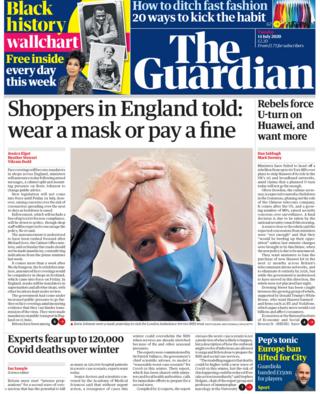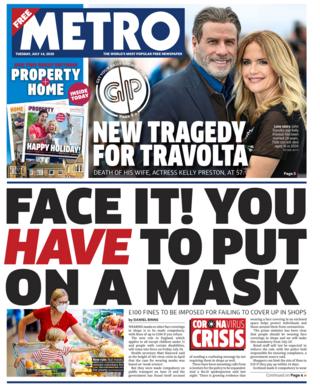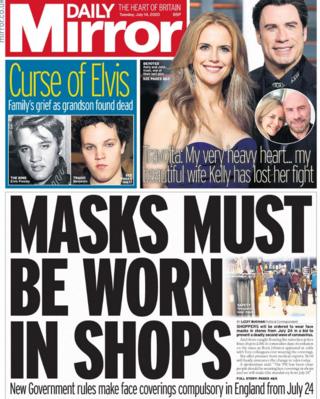 Image caption
A picture of Prime Minister Boris Johnson holding his head as he wears a bright blue face mask takes up much of the Guardian's front page. Like many of the newspapers, it leads on news that shoppers in England will be required to wear a facial covering or face a fine.
Image caption
A picture of Prime Minister Boris Johnson holding his head as he wears a bright blue face mask takes up much of the Guardian's front page. Like many of the newspapers, it leads on news that shoppers in England will be required to wear a facial covering or face a fine.
 Image caption
The Daily Star takes a stronger stance on face masks announcing "It's about bleedin' time!" and mocking up an image of the prime minister as a clown (called Bozo) because the paper says that "we have had months of clowning around".
Image caption
The Daily Star takes a stronger stance on face masks announcing "It's about bleedin' time!" and mocking up an image of the prime minister as a clown (called Bozo) because the paper says that "we have had months of clowning around".
 Image caption
"Face it! You HAVE to put on a mask" is the headline for the Metro. Retail staff will not be responsible for enforcing the rule, the paper says.
Image caption
"Face it! You HAVE to put on a mask" is the headline for the Metro. Retail staff will not be responsible for enforcing the rule, the paper says.
 Image caption
The Daily Mail says that the announcement on face masks "may anger those who find them uncomfortable or dislike the idea of state compulsion". It also finds a "libertarian Tory MP" who, it says, has vowed to stop shopping rather than join the ranks of mask wearers.
Image caption
The Daily Mail says that the announcement on face masks "may anger those who find them uncomfortable or dislike the idea of state compulsion". It also finds a "libertarian Tory MP" who, it says, has vowed to stop shopping rather than join the ranks of mask wearers.
 Image caption
The Daily Telegraph leads on the masks announcement but its front page also carries a story about the prime minister agreeing to demands to ban Chinese firm Huawei from the 5G network. Cartoonist Matt deftly combines the two stories, depicting a man who says he has bought a tiny mask for his phone to prevent the spread of Huawei.
Image caption
The Daily Telegraph leads on the masks announcement but its front page also carries a story about the prime minister agreeing to demands to ban Chinese firm Huawei from the 5G network. Cartoonist Matt deftly combines the two stories, depicting a man who says he has bought a tiny mask for his phone to prevent the spread of Huawei.
 Image caption
To really get the message across to readers, the Daily Express underlines the word "will" in its headline "You will have to wear masks in shops". The paper also carries a story about a gin going on sale with botanicals taken from the Queen's garden at Buckingham Palace.
Image caption
To really get the message across to readers, the Daily Express underlines the word "will" in its headline "You will have to wear masks in shops". The paper also carries a story about a gin going on sale with botanicals taken from the Queen's garden at Buckingham Palace.
 Image caption
Two deaths in US showbiz families are highlighted on the front page of the Daily Mirror. John Travolta speaks of his "heavy heart" at his wife's loss. And the paper says the death at 27 of Elvis Presley's only grandson. Benjamin Keough. is part of the "Curse of Elvis".
Image caption
Two deaths in US showbiz families are highlighted on the front page of the Daily Mirror. John Travolta speaks of his "heavy heart" at his wife's loss. And the paper says the death at 27 of Elvis Presley's only grandson. Benjamin Keough. is part of the "Curse of Elvis".
 Image caption
The Times leads on the story that Britain is set to send one of its new aircraft carriers to the Far East to "confront China". The £3.1bn HMS Queen Elizabeth is expected to carry out exercises with allies in the region including the US and Japan.
Image caption
The Times leads on the story that Britain is set to send one of its new aircraft carriers to the Far East to "confront China". The £3.1bn HMS Queen Elizabeth is expected to carry out exercises with allies in the region including the US and Japan.
 Image caption
To really get the message across to readers, the Daily Express underlines the word "will" in its headline "You will have to wear masks in shops". The paper also carries a story about a gin going on sale with botanicals taken from the Queen's garden at Buckingham Palace.
Image caption
To really get the message across to readers, the Daily Express underlines the word "will" in its headline "You will have to wear masks in shops". The paper also carries a story about a gin going on sale with botanicals taken from the Queen's garden at Buckingham Palace.
Many of the front pages focus on the government's decision to make face coverings mandatory in shops in England from next week - with the Daily Telegraph, the Times and the Daily Mirror all saying that the change in policy came "after days of confusion".
With the headline "It's About Bleedin' Time!", the Daily Star accuses Downing Street of "four months of mixed messages".
According to the Guardian, the announcement is understood to have been "rushed forward" after the Cabinet Office Minister, Michael Gove, said on Sunday that shoppers should not be required to wear masks - "contradicting indications" from Boris Johnson last week. The Daily Mail suggests the move "may anger those who find coverings uncomfortable, or dislike the idea of state compulsion".
Image copyright Andrew Parsons / Parsons Media Image caption Wearing a face mask will be made mandatory inside shops in EnglandWith the government appearing likely to exclude Huawei from the UK's 5G networks, there are contradictory reports on the timetable for the new policy, as well as how Conservative MPs will react.
The Telegraph thinks Boris Johnson "will bow to the demands of his backbenchers" by banning the Chinese firm from next year, with the aim of stripping out all of its infrastructure by 2024. But the Times says ministers will consider plans which would see some Huawei technology remain until 2027 - and the Guardian believes Tory rebels are preparing to "beef up their opposition" unless last-minute changes are made.
The main story in the Financial Times highlights an acknowledgement by government officials that British companies will have to complete an extra 215 million customs declarations to continue to trade with Europe post-Brexit - at a cost of around seven billion pounds a year.
The paper says the forms would need to be filled out "regardless of whether the UK and the EU conclude a trade deal this year with the aim of removing all tariffs and quotas" - and would be mirrored by the same process by counterparties in the EU, resulting in some 430 million forms in total each year. The shadow Cabinet Office Minister, Rachel Reeves, is quoted as describing the extra bureaucracy as "staggering".
Image copyright Andrew Matthews/PA Media Image caption The HMS Queen Elizabeth will be heading to the Far East "to confront" China, according to the TimesThe Times claims to have learned that plans have been drawn up for one of Britain's two new aircraft carriers to be sent to the Far East - as part of efforts to counter what the paper calls "an increasingly assertive China." It says HMS Queen Elizabeth is expected to conduct military exercises with allies including the US and Japan after setting sail on its maiden grand voyage early next year. The fleet commander, Vice-Admiral Jerry Kyd, is reported to have told an online seminar that Britain's F-35 stealth fighter jets could be based in the region - with the carrier being used to take them out and bring them home again.
Research by the University of Cambridge which suggests that apathy - not depression - could be an early warning sign of dementia is featured by the Telegraph. Scientists found that people with higher baseline apathy, as well as those with increasing apathy over time, had a greater risk of dementia - whereas neither baseline depression nor changes in depression had any detectable influence on whether individuals developed the condition. The paper says the research suggests the belief that depression is a risk factor for dementia may be because some depression scales used by clinicians partially assess apathy.
Sign up for a morning briefing direct to your inbox

 5 years ago
790
5 years ago
790 

